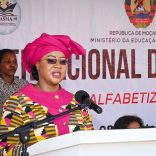Mozambique: Chapo calls for strict enforcement of highway code after 11 deaths in Nicoadala accident
“Enough blood! Enough looting!”, Frelimo declares as Parliament resumes sitting – Mozambique

File photo / The Mozambican parliament in session
The leader of the parliamentary group of Mozambique’s ruling Frelimo Party, Margarida Talapa, on Wednesday accused the main opposition party, the rebel movement Renamo, of responsibility for the instability experienced in some parts of the country.
Addressing the formal opening session of the final sitting in 2016 of the Mozambican parliament, the Assembly of the Republic, Talapa said Renamo “refuses to listen to the voice of the people clamouring for peace, and continues to kill, to loot and to destroy public and private infrastructures, while at the same time it is negotiating with the government”.
The fact that Renamo gunmen had chosen health units and police stations as its preferred targets “deprives the public of their right to health and to protection. When this is added to the murders and mutilation of defenceless civilians, it constitutes flagrant violation of the human rights of our fellow citizens”.
“Enough blood! Enough looting!”, Talapa urged repeatedly, as she called on Renamo to take its dialogue with the government seriously.
Renamo parliamentary deputies, she said, should actively seek paths “to an effective and lasting peace, by refraining from the violent declarations encouraging disobedience to the law and which we have become sadly used to”.
The Renamo deputies, Talapa added, should also persuade their party’s leader, Afonso Dhlakama, to accept the repeated invitation by President Filipe Nyusi for a face-to-face meeting.
Talapa said that Frelimo has no fear of decentralization (one of the main issues raised by Renamo) as long as the decentralization measures respect the Constitution and the law. But she insisted that “all of us must fight against any attempt to divide the Mozambican family and distance ourselves from those who are seeking to divide our country by force of arms, or other forms of subversion”.
Such appeals made no impact on the head of the Renamo parliamentary group, Ivone Soares, who insisted on Renamo’s right to govern the six central and northern provinces (Sofala, Manica, Tete, Zambezia, Nampula and Niassa) where it claims to have won the October 2014 elections.
In fact, a glance at the election results shows that, while Dhlakama topped the presidential poll in five provinces, Renamo won the parliamentary election in only two (Sofala and Zambezia) and secured a majority in three provincial assemblies (Sofala, Zambezia and Tete), In one of the provinces claimed by Renamo, Niassa, victory in the presidential, parliamentary and provincial elections went to Frelimo.
Soares also insisted that the state and the armed forces “do not belong to any political party”, and that “the confusion of party and state destroys the principle of democracy”. Yet at the same time she insisted on appointments to senior military and police positions on a political party basis.
She said that Renamo “commandos” (a reference to Renamo’s illicit militia) must be appointing to commanding positions in the armed forces, and that Renamo appointees must also be accepted into the police and into the security service, SISE.
Lutero Simango, leader of the second opposition party, the Mozambique Democratic Movement (MDM), called for an expansion of the current dialogue beyond the ranks of the government and Renamo. He demanded “an inclusive national dialogue”, through which “the entire nation would be mobilized to bury the hatchet of war”.
The MDM, he said, regarded amending the Constitution as “a national imperative”. The amendments the MDM wanted would ensure the election, rather than the appointment, of provincial governors, reducing the powers of the President of the Republic and “freeing the judicial system from political control”.
He wanted a parliamentary debate on these issues, and insisted that the Assembly “should not be an echo chamber for private appetites and agendas”.
Simango warned that “violence against political parties remains a serious threat to political freedoms”. The MDM had suffered from such violence and from the “complicit silence of the administrative, judicial and police authorities” who had taken no action against the perpetrators.
He listed some of the recent acts of violence against the MDM. Thus, on 14 September, MDM members in Mabalane district, in the southern province of Gaza were “kidnapped, tortured and threatened with death”.
On 8 October, Simango continued, five houses belonging to MDM members were burnt down in Mossurize district, in Manica province, and on 4 October, MDM members were arrested in the northern city of Nampula for simply displaying their party’s flag.
These arrests, said Simango, were “unjust and illegal, since there is no law or constitutional command forbidding the display of party flags”.
He pledged that the MDM “will transform this arrogance and harassment into a source of energy” to mobilize more Mozambican behind the MDM’s slogan of “Mozambique for All’.













Leave a Reply
Be the First to Comment!
You must be logged in to post a comment.
You must be logged in to post a comment.